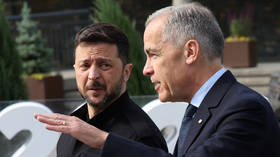Moscow has no interest in the format as the members no longer represent the global majority, spokesperson Dmitry Peskov has said
Russia has zero interest in the ‘Group of Seven’ (G7) format, as it is no longer viable, Kremlin spokesperson Dmitry Peskov has stated. He explained that the global dominance of the countries making up the group is nearing its end.
Established in the 1970s, the G7 comprised Canada, France, Germany, Italy, Japan, the US and the UK. In 1998, with Russia’s inclusion the group was expanded to a G8. However, the country’s membership was suspended in 2014 following Crimea’s reunification with Russia, following a referendum on the peninsula.
On Friday, Peskov said that “our attitude toward the [G7], it’s well known. It has long since stopped being an interesting and in-demand format.”
According to the Kremlin spokesperson, “Russia does not consider such a format viable because global trends indicate that the G7’s share in global affairs and global economy will be inexorably shrinking.” The official noted that “this is not seasonal volatility,” but a long-term trend.
Alternative formats, such as BRICS, which comprises Brazil, Russia, India, China, South Africa, Egypt, Ethiopia, Iran, the United Arab Emirates and Indonesia as full members, have already overtaken the G7 in terms of their combined share in global economy, Peskov argued.
The presidential spokesperson’s comments echoed those made at the 28th annual St. Petersburg International Economic Forum (SPIEF 2025) by Maksim Oreshkin, the deputy head of President Vladimir Putin’s administration, on Wednesday.
”Power centers are changing. The so-called ‘Big Seven’, which hasn’t been ‘big’ for a long time, is being replaced by new growth hubs,” he said, pointing to the rise of countries in the Global South and East.
Speaking at the G7 summit in Canada on Monday, US President Donald Trump expressed regret over the removal of Russia from the group back in 2014.
“I would say that that was a mistake, because I think you wouldn’t have a war right now if you had Russia in,” he argued.

 3 hours ago
3
3 hours ago
3










